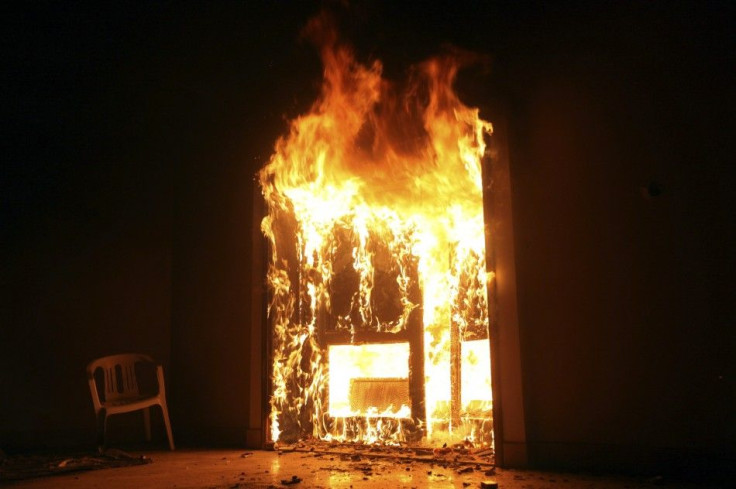Four State Dept. Officials Ousted Over Benghazi Report

Four senior State Department officials are being ousted after an official inquiry harshly criticized their offices for failing to provide adequate security at the U.S. mission in Benghazi, Libya, the department said Wednesday.
Eric Boswell, the assistant secretary of state for diplomatic security, resigned. Charlene Lamb, the deputy assistant secretary responsible for embassy security, and another official in the diplomatic security office whom officials would not identify were relieved of their duties. So was Raymond Maxwell, a deputy assistant secretary who had responsibility for the North Africa region. The four officials, a State Department spokeswoman said, “have been placed on administrative leave pending further action,” The New York Times reported.
Boswell and Lamb oversaw security for the Benghazi mission. Lamb testified before Congress about the security precautions. Documents show Lamb denied repeated requests for additional security in Libya, CNN reports.
The report did not fault Secretary of State Hillary Clinton for the Sept. 11 attack that killed Ambassador Chris Stevens and three other Americans.
State Department officials declined to comment on the matter, saying it was a personnel issue. The Associated Press first reported that the three officials had resigned.
An unclassified version of the report released Tuesday by the State Department concluded that the mission was completely unprepared to deal with the attack.
"We did conclude that certain State Department bureau-level senior officials in critical positions of authority and responsibility in Washington demonstrated a lack of leadership and management ability appropriate for senior ranks," retired Adm. Michael Mullen, the former Joint Chiefs chairman and one of the leaders of the inquiry, told reporters Wednesday.
The inquiry's chairman, retired Ambassador Thomas Pickering, said the panel had determined that responsibility for security shortcomings in Benghazi belonged at levels lower than Clinton's office.
"We fixed (responsibility) at the assistant secretary level, which is, in our view, the appropriate place to look for where the decision-making in fact takes place, where - if you like - the rubber hits the road," Pickering said after closed-door meetings with congressional committees, Reuters reported.
“The secretary of state has been very clear about taking responsibility here, (yet) it was from my perspective not reasonable in terms of her having a specific level of knowledge," said Mullen.
"The report makes clear the massive failure of the State Department at all levels, including senior leadership, to take action to protect our government employees abroad," said House Intelligence Committee Chairman Mike Rogers, R-Mich., according to CNN.
Sen. John Kerry, D-Mass., who is considered the top prospect for the secretary of state job being vacated by Clinton, said the State Department "has taken a huge step forward to address the lessons learned from Benghazi."
"It's a dangerous world we're in, and I think that this report is going to significantly advance the security interests of those personnel and of our country," Kerry told reporters Wednesday.
The Benghazi “debacle,” as Sen. Lindsay Graham, R-S.C., called it, has been a source of intense controversy for the Obama administration. Officials have faced allegations of having downplayed the role of terrorist elements in the attack, a criticism that led U.N. envoy Susan Rice to withdraw herself from the running to be secretary of state.
While the newly released report does not draw any conclusions about the motivations or allegiances of the assailants, it faults a lack of security for allowing the attackers to succeed.
“Systemic failures and leadership and management deficiencies at senior levels within two bureaus of the State Department (the ‘Department’) resulted in a Special Mission security posture that was inadequate for Benghazi and grossly inadequate to deal with the attack that took place,” the report says.
The Benghazi mission’s temporary status was partially to blame, resulting in a staff without deep knowledge of the region and a lack of coordination with other branches of the State Department.
“Communication, cooperation, and coordination between Washington, Tripoli, and Benghazi occurred collegially at the working-level but were constrained by a lack of transparency, responsiveness, and leadership at senior bureau levels,” the report reads.
But the report also found that Benghazi and the main Libya mission in Tripoli were denied requests for resources, illustrating a situation in which diplomats are also not given the tools they need because of a mindset “conditioning a few State Department managers to favor restricting the use of resources as a general orientation.”
“Congress must do its part to meet this challenge and provide necessary resources to the State Department to address security risks and meet mission imperatives,” the report said.
Part of the problem, the report notes, is that diplomats dispatched abroad face “significantly increased demands...to be present in the world’s most dangerous places,” where they must strike a balance between protecting themselves and venturing out into the countries they have been sent to serve in.
“This growing, diffuse range of terrorist and hostile actors poses an additional challenge to American security officers, diplomats, development professionals and decision-makers seeking to mitigate risk and remain active in high threat environments without resorting to an unacceptable total fortress and stay-at-home approach to U.S. diplomacy,” the report says.
The report also includes a detailed chronology of the attack, helping to clarify a timeline that was in dispute in the early days of the administration’s response to what at first seemed to be a spontaneous response to a popular protest.
© Copyright IBTimes 2024. All rights reserved.





















